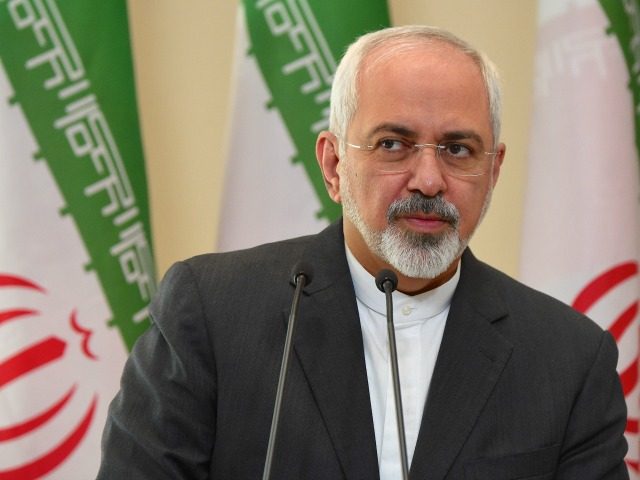Iranian Foreign Minister Mohammad Javad Zarif insisted in a CNN interview on Sunday that his country has been faithful to the Joint Comprehensive Plan of Action (JCPOA), also known as the Iran nuclear deal, while the United States has “failed to implement its part of the bargain.”
CNN host Fareed Zakaria asked Zarif about the recent letter from Senators Marco Rubio (R-FL), Ted Cruz (R-TX), David Perdue (R-GA), and Tom Cotton (R-AR) to Secretary of State Rex Tillerson asking him to provide “a sober accounting of Iran’s JCPOA violations as well as the regime’s aggressive and destabilizing behavior.”
“In light of Iran’s malign actions since the signing of the JCPOA, the only reasonable conclusion is that the full suspension of U.S. sanctions is not in the vital national security interests of the United States and that Iran has consistently violated the terms of the JCPOA,” the Republican senators wrote.
A list of specific violations was provided, including Iran operating more advanced nuclear centrifuges than the deal allows, repeatedly exceeding the limits placed on heavy water stocks, continuing its illicit attempts to purchase nuclear and missile technology, and refusing to grant required access to international inspectors at its research and military facilities.
The senators further accused Iran of waging “a campaign of regional aggression,” sponsoring international terrorism, developing ballistic missile technology, and oppressing its own people.
“When we negotiated the deal, we decided to make the IAEA the only accepted body to monitor the implementation of the nuclear side of the deal,” Zarif said in response on CNN. “The IAEA has verified, I believe seven times now since the implementation day, that Iran has implemented the deal faithfully and completely.”
“Unfortunately, we cannot make the same statement about the United States,” the Iranian Foreign Minister continued. “The United States has failed to implement its part of the bargain.”
“Specifically what?” Zakaria asked.
“For instance, when the White House made an announcement a couple of days ago that President Trump used his presence in Hamburg during the G20 meeting in order to dissuade leaders from other countries to engage in business with Iran,” Zarif replied. “That is a violation of not the spirit, but of the letter of the JCPOA, of the nuclear deal.”
“I believe the United States needs to bring itself into compliance with its part of the obligation under the deal,” he said. “Iran has been complying. It has been verified by the IAEA.”
Pressed on German intelligence reports that Iran is still attempting to acquire banned technology, as the Republican senators mentioned in their letter, Zarif repeated his insistence that the IAEA is the only monitoring body Iran recognizes, and “it has verified that Iran is complying with the deal.”
“Let me point out here that the deal does not prevent Iran from continuing with its peaceful nuclear program,” he added:
The deal is very clear. It recognizes Iran’s right to engage in enrichment. It is enrichment for peaceful purposes. I believe it was the realization of knowledge that had been acquired by Iran domestically and through the work of our scientists could not be taken away from Iran, and the best way was to have it monitored.
Later in the interview, Zarif said President Trump’s Middle East policy was “misplaced and misguided” because he favors Iran’s rival Saudi Arabia. Zarif accused the Saudis of spreading the ideology “responsible for hatred, extremism, and fanaticism” around the world and corrupting Islam. He added that ISIS, al-Qaeda, and their offshoots receive money and support from “others who call themselves U.S. allies,” but not Iran.
Senators Cruz, Rubio, Perdue, and Cotton mentioned the International Atomic Energy Agency in their letter, denouncing Iran’s reliance upon “side arrangements” it made with the IAEA that have yet to be provided to the U.S. Congress for a full review and noting that even IAEA inspectors have been denied physical access to nuclear sites in violation of Iran’s commitments under the JCPOA.
Former U.N. Ambassador John Bolton wrote in at The Hill on Sunday that the State Department’s certification of Iranian compliance with the nuclear deal is an “unforced error” by the Trump administration.
Bolton advised President Trump to withdraw from the nuclear deal as soon as possible because even if Iran was not committing the violations the State Department overlooks, the deal is still “palpably harmful to American national interests.” Among other reasons, he cited ongoing Iranian cooperation with North Korea on their nuclear and ballistic missile programs.
“The Trump administration itself has already shown the courage of its convictions by withdrawing from the Paris climate accords. Compared to that, abrogating the JCPOA is a one-inch putt,” said Bolton. He endorsed the idea of declassifying the first semi-annual report of Iranian noncompliance assembled by the Trump administration, so the entire world would be able to see America’s evidence that Iran is violating the deal.
House Foreign Affairs Committee Chairman Ed Royce (R-CA) marked the two-year anniversary of the JCPOA by saying it was so poorly written that Iran can continue working toward nuclear weapons without technically violating it.
“If Iran has not materially breached the agreement, it’s only because the JCPOA is so deeply flawed. It allowed Iran to keep thousands of nuclear centrifuges spinning and, even without cheating, keep a path to a nuclear weapon,” said Royce.

COMMENTS
Please let us know if you're having issues with commenting.